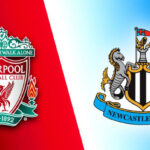Newcastle United vs Alexander Isak: A Transfer Saga That Could Define the Club’s Future

The summer of 2025 has delivered one of the most dramatic transfer sagas in recent Premier League memory, with Newcastle United and their star striker Alexander Isak locked in an increasingly bitter public dispute that threatens to overshadow the club’s ambitious project under Saudi ownership.
On a Monday evening in August 2025, Newcastle United supporters were left stunned when Alexander Isak took to Instagram with a cryptic but devastating message that would send shockwaves through St. James’ Park. The Swedish international, who had been notably absent from both pre-season activities and the club’s opening Premier League fixture against Aston Villa, broke his silence in dramatic fashion.
“When promises are broken, and trust is lost, the relationship can’t continue,” Isak wrote in what many interpreted as a direct challenge to Newcastle’s hierarchy. The post came after his absence from the Professional Footballers’ Association Awards ceremony, where he had been nominated for individual recognition and was named in the Premier League Team of the Year – accolades that should have been celebrated but instead became overshadowed by the uncertainty surrounding his future.
The timing of Isak’s statement could hardly have been more significant. Newcastle had just begun their new Premier League campaign with a disappointing draw against Aston Villa, a match that highlighted exactly why losing their star striker would be catastrophic for their ambitions. Without Isak’s clinical finishing and intelligent movement in the box, the Magpies struggled to create clear-cut chances against well-organized opposition.
Newcastle United’s response was swift and uncompromising, reflecting the seriousness with which the club views this unprecedented public challenge from one of their most valuable assets. In a statement that demonstrated both disappointment and determination, the club made their position crystal clear.
“We are disappointed to have been alerted to a social media post by Alexander Isak this evening,” Newcastle’s official statement began, the carefully chosen words conveying the club’s frustration at having their dirty laundry aired in public. “Alex remains under contract, and no commitment has ever been made by any club official that he could leave Newcastle United this summer.”
This response was particularly significant because it directly contradicted any suggestion that the club had given Isak verbal assurances about a potential departure. If accurate, it suggests that either there has been a serious miscommunication between player and club, or that Isak’s camp has misinterpreted discussions about his future. The club’s emphasis on the lack of any official commitment indicates they believe they have acted within their rights throughout the saga.
The statement continued with Newcastle attempting to strike a balance between firmness and diplomacy: “While we value players’ opinions and understand their aspirations, the club must make decisions that serve the best interests of the team, our supporters, and the long-term vision we are building here at Newcastle United.”
This carefully crafted language reveals the delicate position Newcastle finds itself in. On one hand, they cannot be seen to capitulate to player demands, as this would set a dangerous precedent for future negotiations. On the other hand, they recognize the need to maintain some semblance of a relationship with a player who, if he stays, will be crucial to their success this season.
The club’s final words on the matter carried both a warning and an olive branch: “Alex remains part of our family and will be welcomed back when he is ready to rejoin his teammates.” The use of the word “family” was deliberate, emphasizing the personal relationships that have been damaged by this very public dispute, while the conditional nature of his welcome back suggests that the ball is firmly in Isak’s court.
Central to understanding this saga is the persistent interest from Liverpool, a club that has emerged as the most credible suitor for Isak’s services. The Reds’ pursuit of the Swedish striker represents more than just a typical transfer pursuit – it’s part of a broader strategic shift as they look to refresh their attacking options under new management.
Liverpool’s initial approach earlier in the transfer window demonstrated serious intent, with club officials making direct contact with Newcastle to test the waters. However, faced with Newcastle’s astronomical valuation and unwillingness to negotiate, Liverpool temporarily pivoted their attention to alternative targets, including French striker Hugo Ekitike, who was seen as a more financially viable option.
The timing of Liverpool’s interest is particularly intriguing given the fixture list. Newcastle are scheduled to host Liverpool at St. James’ Park this weekend, creating a potentially explosive atmosphere where the very player at the center of this transfer saga could find himself facing his potential future employers. The psychological impact of such a scenario cannot be understated – for Isak, his current teammates, Newcastle’s supporters, and Liverpool’s traveling contingent.
Liverpool’s interest in Isak is not merely opportunistic; it represents a calculated assessment of their squad needs. The departure of several aging forwards and the need for a clinical finisher to complement their existing attacking talent has made Isak a priority target. His Premier League experience, proven goal-scoring record, and age profile make him an ideal candidate to lead Liverpool’s attack for the next several years.
Perhaps the most contentious aspect of this entire saga is Newcastle’s unwavering £150 million valuation of Alexander Isak. This astronomical figure has become the immovable object against which all interested clubs have seen their ambitions crash, and it reveals much about Newcastle’s strategic thinking under their new ownership.
The £150 million price tag is not arbitrary – it reflects several key factors that Newcastle’s decision-makers have carefully considered. Firstly, it acknowledges Isak’s status as one of the Premier League’s most promising young strikers, with a goal-scoring record and technical ability that places him among the elite forwards in world football. His consistency in front of goal, combined with his versatility and work rate, makes him an invaluable asset in the modern game.
Secondly, the valuation reflects Newcastle’s improved financial position under Saudi ownership. Unlike previous eras when the club might have been forced to accept below-market value for their best players, Newcastle now has the financial strength to dictate terms. They are no longer a selling club that must bow to the financial might of traditional powerhouses – they have become one of those powerhouses themselves.
However, the £150 million figure also serves a strategic purpose beyond mere profit maximization. It effectively prices out most potential suitors, including Liverpool, who despite their resources would struggle to justify such an enormous outlay on a single player. This suggests that Newcastle’s valuation is designed more to retain Isak than to facilitate his departure – a clear message that they view him as absolutely integral to their project.
The astronomical fee also reflects the current transfer market reality, where proven Premier League performers command premium prices. Newcastle’s calculation appears to be that if they are going to lose their star striker, they will extract every possible penny from his departure, money that can then be reinvested in strengthening other areas of the squad.
Understanding Alexander Isak’s perspective is crucial to grasping why this situation has escalated to such a public confrontation. The Swedish striker’s frustration appears to stem from what he perceives as broken promises and a lack of transparency from Newcastle’s hierarchy about his future.
From Isak’s standpoint, his rapid development into one of the Premier League’s most feared strikers should have been rewarded with either a significant improvement in his contract terms or the flexibility to move to a club competing at the highest level of European football. His goal-scoring record for Newcastle has been exemplary, and his performances have consistently been among the highlights of the team’s matches.
The striker’s absence from pre-season activities was the first public indication that all was not well behind the scenes. Pre-season is typically when players build fitness, develop understanding with teammates, and prepare for the rigors of the upcoming campaign. Isak’s decision to withdraw from these activities suggests that his dissatisfaction had reached a point where he felt unable to fully commit to Newcastle’s preparations.
His absence from the PFA Awards, where he was both nominated and recognized in the Team of the Year, was perhaps even more telling. These awards represent peer recognition – acknowledgment from fellow professionals of his outstanding contributions to the Premier League. To miss such an event suggests a level of disillusionment that goes beyond typical contract negotiations.
The Instagram post itself reveals a player who feels betrayed by the institution he has served with distinction. The carefully chosen words – “When promises are broken, and trust is lost” – suggest that Isak believes he received assurances about his future that have not been honored. Whether these were explicit promises about a potential transfer or more general commitments about the club’s ambitions remains unclear, but the personal nature of his grievance is evident.
This saga cannot be understood in isolation from Newcastle United’s broader strategic objectives under Saudi ownership. The club’s new owners have made no secret of their ambition to transform Newcastle into a global powerhouse capable of competing with Europe’s elite clubs. This transformation requires not just significant investment in players and infrastructure, but also the retention of key talents who can form the foundation of future success.
Alexander Isak represents more than just a goal scorer in this context – he is a symbol of Newcastle’s rising ambitions. His development from a promising young talent at Real Sociedad and Borussia Dortmund into a Premier League star has coincided with Newcastle’s own transformation. Losing him now would send a message that the club is still vulnerable to the predatory approaches of traditional big clubs, undermining the narrative of Newcastle as an ascending force.
The club’s investment in squad development has been substantial, with significant sums spent on improving the overall quality of the team. From a strategic perspective, maintaining the core of this improved squad is essential to building momentum and establishing Newcastle as a consistent top-four contender. Isak’s departure would not only remove their primary goal threat but also signal to other key players that Newcastle remains a stepping stone rather than a destination.
Furthermore, Newcastle’s participation in European competition – a goal that drives much of their current strategy – would be severely compromised without their star striker. The club’s supporters, who have endured years of mediocrity and false promises, deserve to see their best players commit to the project rather than using it as a platform for moves to more established clubs
As the summer transfer window progresses, the pressure on all parties to resolve this situation intensifies dramatically. For Newcastle, every day that passes with Isak absent from training and team activities represents a deterioration in their preparations for the new season. The club’s coaching staff must plan tactics and formations without knowing whether their primary goal scorer will be available, creating uncertainty that affects the entire squad.
Liverpool, meanwhile, face their own time pressure. Their pursuit of attacking reinforcements has been ongoing throughout the summer, and continued uncertainty over Isak’s availability forces them to maintain interest in alternative targets while risking missing out on other opportunities. The club’s supporters are growing increasingly anxious about the lack of significant signings, particularly in attacking areas where they have identified clear needs.
The situation is further complicated by the approaching fixture between Newcastle and Liverpool. Should Isak remain absent for this high-profile encounter, it will generate intense media scrutiny and speculation about his future. Conversely, should he return to face his potential future club, the psychological dynamics could be fascinating to observe
Other clubs monitoring the situation are likely waiting to see whether Newcastle’s resolve weakens as the window deadline approaches. The possibility of a late bid from an unexpected source cannot be discounted, particularly if Isak’s public stance encourages other interested parties to test Newcastle’s determination
The elephant in the room throughout this saga has been the impact of Financial Fair Play regulations on all parties involved. Newcastle’s ability to demand such a high fee for Isak is partly predicated on their need to balance their books following significant investment in squad development. The sale of their star striker would provide substantial funds that could be reinvested while ensuring compliance with FFP requirements.
For Liverpool, the £150 million valuation must be considered against their own FFP constraints and the need to maintain a balanced squad development approach. Such a significant outlay on a single player would necessarily limit their ability to strengthen other areas of the squad, creating strategic decisions about resource allocation.
The broader implications of FFP on the modern transfer market are clearly illustrated by this saga. The regulations, designed to prevent clubs from spiraling into financial difficulties, have created a complex web of considerations that extend far beyond the simple desire to buy or sell a player.
Lost in the tactical and financial discussions surrounding this saga is the human element that affects all parties involved. Alexander Isak is a young man whose career ambitions and personal goals are being weighed against contractual obligations and club strategies. The pressure of such public scrutiny, particularly in the age of social media, can be immense for any individual.
Similarly, Newcastle’s hierarchy must balance their strategic objectives with the need to maintain positive relationships with their playing staff. The way they handle this situation will be closely watched by other players and their representatives, potentially affecting future recruitment and retention efforts.
The supporters of both clubs are also emotionally invested in the outcome. Newcastle fans, who have embraced Isak as one of their own, face the possibility of losing a player who represents hope and progress. Liverpool supporters, meanwhile, see him as a potential catalyst for their own renewed ambitions.
As this saga continues to unfold, several potential outcomes remain possible. The most straightforward resolution would see Isak accept Newcastle’s position and return to training, though this seems increasingly unlikely given the public nature of his dissatisfaction. Such a scenario would require significant relationship repair work from all parties.
Alternatively, a compromise might be reached whereby Newcastle agree to a structured departure either in the current window or the following summer, potentially with improved contract terms in the interim. This would allow the club to maintain their stance while providing Isak with the assurances he appears to be seeking.
The nuclear option – a prolonged standoff that sees Isak remain absent for an extended period – would benefit no one but cannot be entirely discounted. Such scenarios have occurred before in football, though they typically resolve before causing permanent damage to all parties involved.
The Alexander Isak saga represents far more than a simple transfer dispute. It is a defining moment for Newcastle United’s project under Saudi ownership, a test of their ability to retain their best talents in the face of interest from traditional powerhouses. The outcome will send a message throughout the football world about Newcastle’s status and ambitions.
For Isak himself, the situation represents a crossroads in his career. His decision in the coming days and weeks will determine not only his immediate future but also his legacy at St. James’ Park. Whether he will be remembered as a Newcastle legend who helped drive the club’s renaissance or as a talented player who departed at the first opportunity remains to be seen.
The resolution of this saga will have implications that extend far beyond the immediate parties involved. It will influence transfer strategies, player power dynamics, and the ongoing evolution of Newcastle United as a football institution. With tensions reaching boiling point and the weekend fixture against Liverpool looming, the stage is set for one of the most dramatic conclusions to a transfer saga in recent memory.
Whatever the outcome, the Alexander Isak situation has already demonstrated the complexities and pressures of modern football, where sporting ambitions, financial realities, and human emotions collide in an increasingly public arena. The next chapter of this story promises to be as compelling as anything that has come before.















